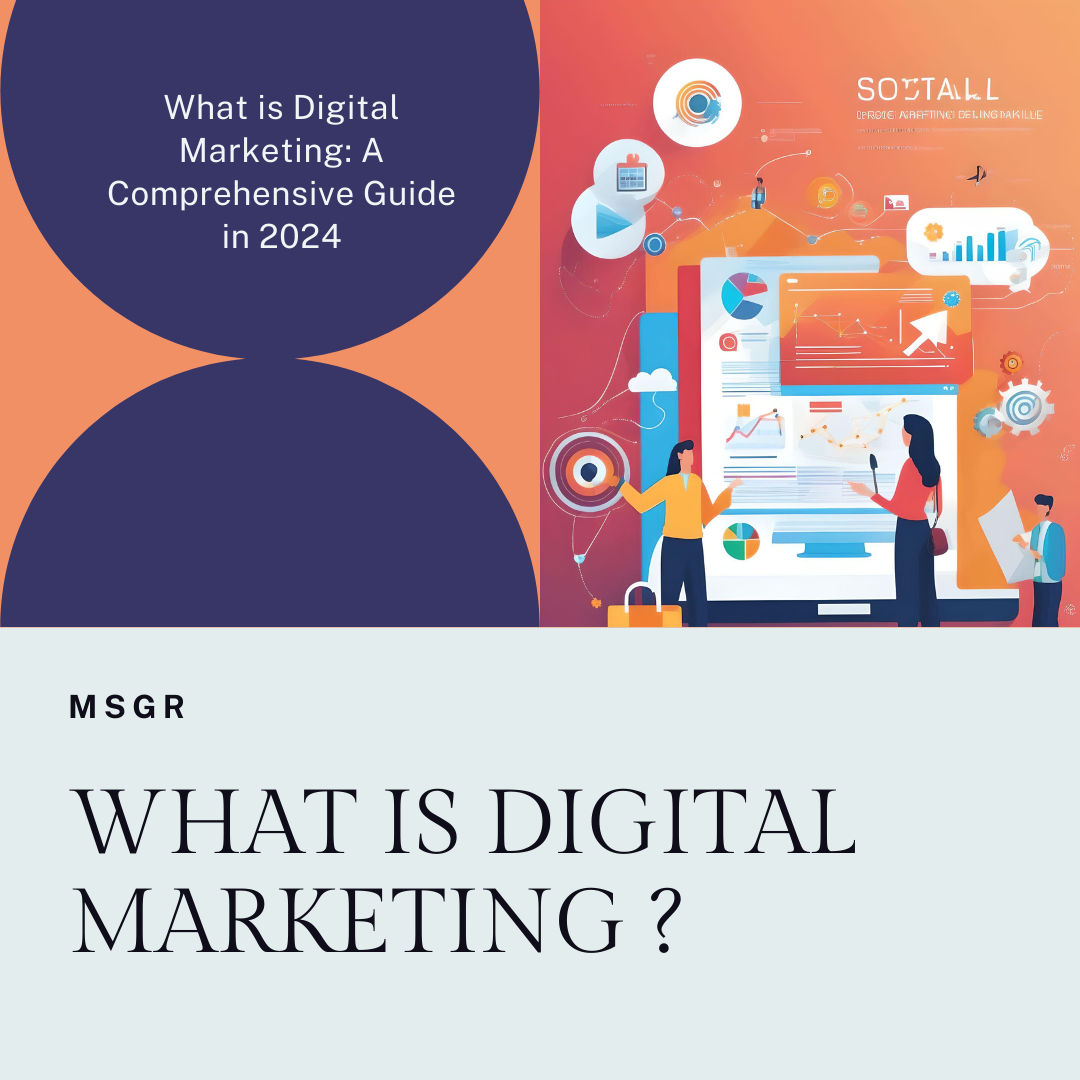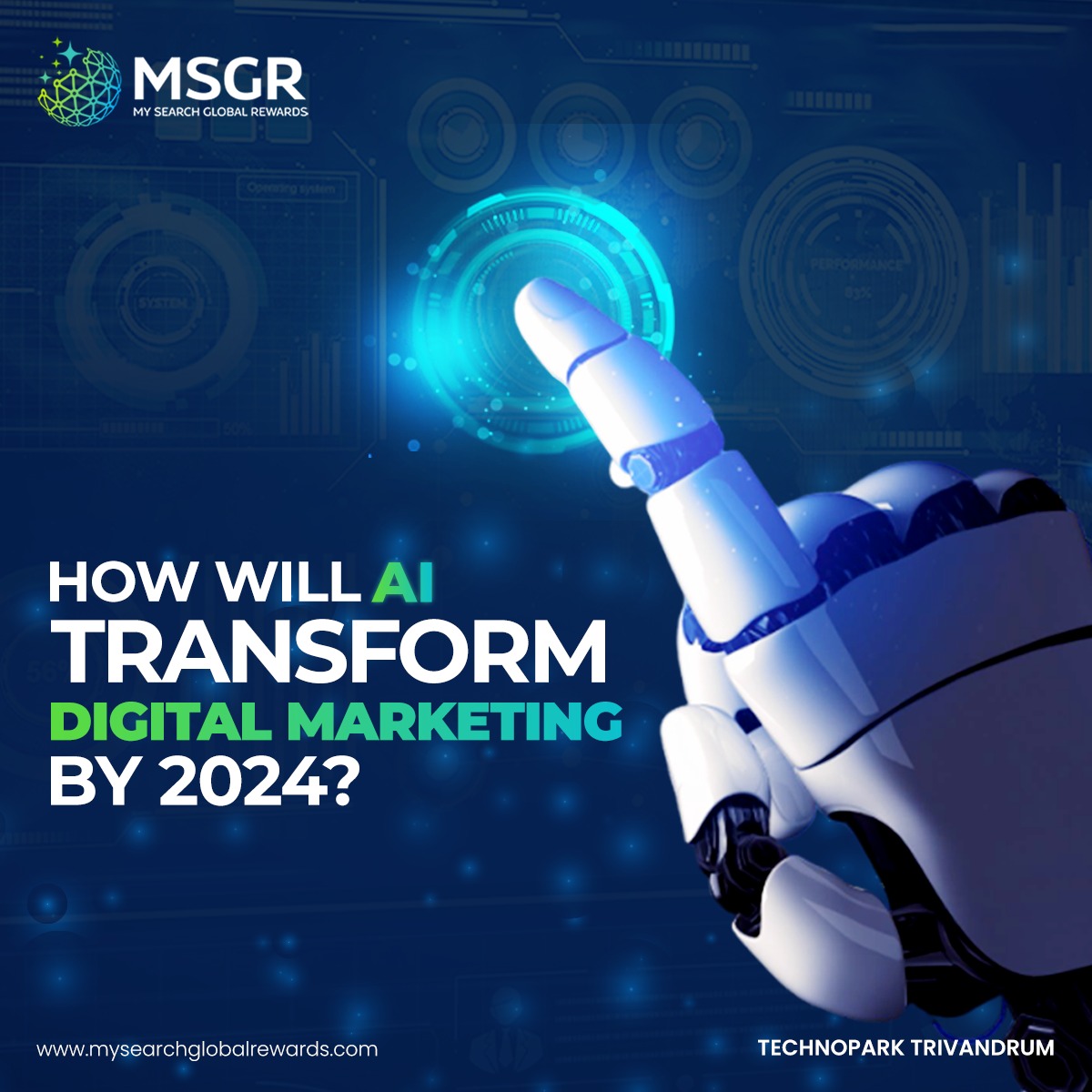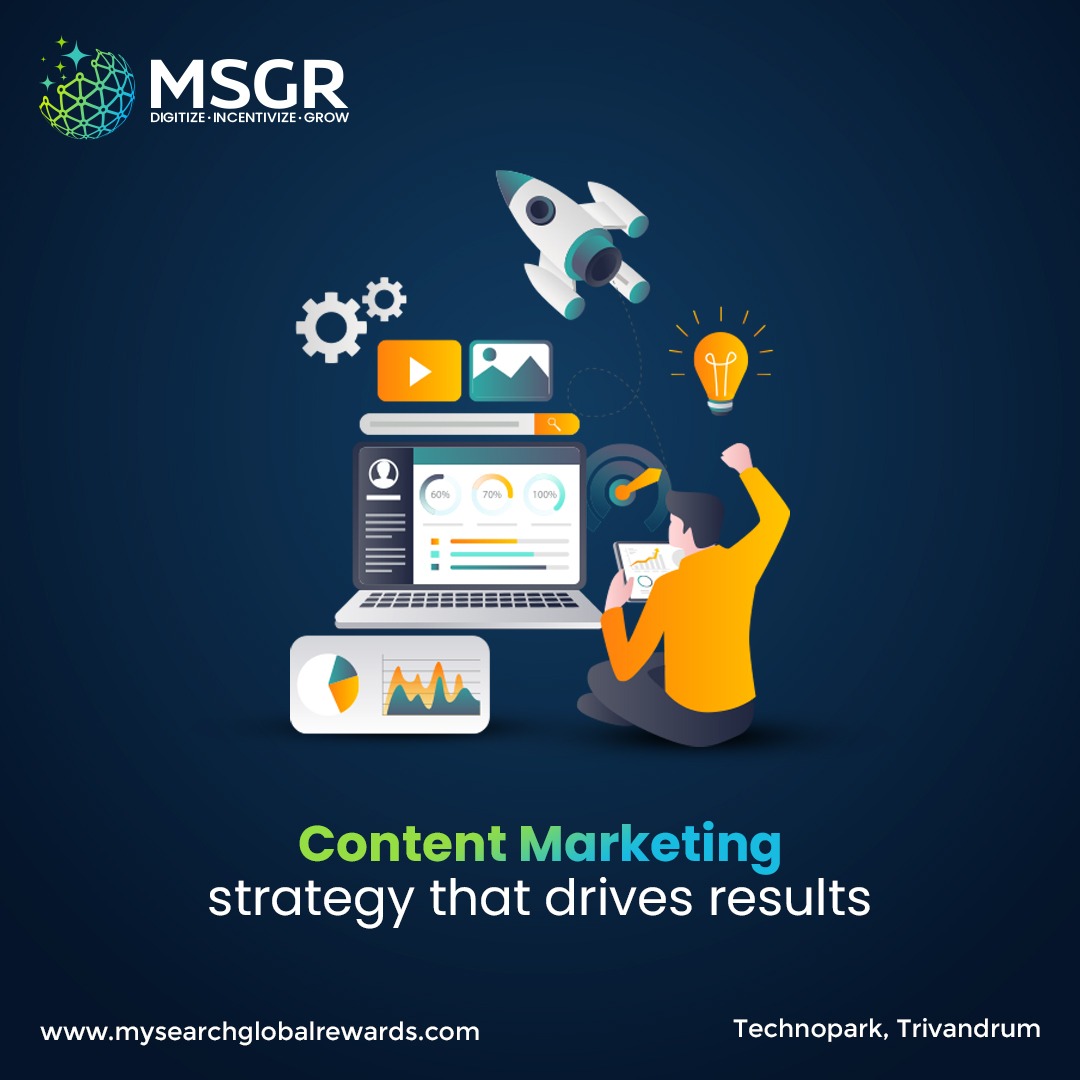Digital Marketing
In 2024, digital marketing stands as a wide range of opportunity for businesses seeking to expand their reach, engage with customers and drive growth. Harnessing the myriad tools and strategies within the digital realm, marketing specialists can craft compelling campaigns that resonate with audiences across various platforms and devices. This comprehensive guide explores the intricacies of digital marketing, offering insights into its diverse forms, best practices, and the transformative impact it can have on businesses of all sizes.
Introduction to Digital Marketing
Digital marketing, the cornerstone of modern promotional efforts, encompasses a broad spectrum of strategies aimed at connecting brands with potential customers through electronic devices and online channels like Facebook, Instagram, Linkedin, Whatsapp, Youtube, Google etc. From email campaigns to social media posts, digital marketing leverages the vast reach of the internet to deliver targeted messaging and measure its impact throughout the customer journey.
In today's digital landscape, where over three-quarters of Americans access the internet daily, establishing a robust online presence is imperative for businesses seeking to thrive in a competitive market. With 89% of Americans utilizing mobile internet on a daily basis, the opportunities for reaching and engaging with audiences are virtually limitless. As such, embracing a comprehensive digital marketing strategy is essential for building brand awareness, fostering customer relationships, and driving business growth.
In India 52% of the population or 759 million people access the internet at least once in a month. By 2025, the number is expected to grow around 900 million.
What is Digital Marketing? Types of Digital Marketing in 2024
Digital marketing encompasses a diverse array of tactics and techniques designed to promote brands and engage with audiences in the digital media. From search engine optimization (SEO) to content marketing and social media advertising, each component plays an important role in reaching and resonating with target demographics and audience interest.
1. Search Engine Optimization (SEO)
At the core of any successful digital marketing strategy lies search engine optimization (SEO), the art and science of enhancing web pages to improve their visibility and ranking on search engine results pages (SERPs). By optimizing content, improving user experience, and building high-quality backlinks, businesses can increase their chances of appearing prominently in search engine results and attracting organic traffic.
Key elements of effective SEO include:
Creating high-quality, engaging content.
Enhancing user experience and mobile-friendliness.
Building reputable backlinks from authoritative websites.
Optimizing technical aspects of website performance.
While SEO strategies may vary based on evolving search engine algorithms, the overarching goal remains consistent: to achieve higher rankings and greater visibility on SERPs, thereby driving organic traffic and increasing brand exposure widely.
2. Content Marketing
Content marketing serves as a cornerstone of digital marketing, encompassing the creation and distribution of valuable, relevant content to attract and engage large target audiences. Through blog posts, e-books, videos and other formats, businesses can establish thought leadership, foster trust, and drive customer engagement.
Key elements of effective content marketing include:
Identifying target audience preferences and interests.
Creating high-quality, informative content.
Distributing content across relevant channels.
Measuring engagement and adjusting strategies accordingly.
delivering content that addresses customer needs and interests, businesses can position themselves as industry authorities and cultivate lasting relationships with their audience.
3. Social Media Marketing
Social media serves as a dynamic platform for engaging with audiences, amplifying brand messaging, and driving customer interactions. With 5.04 billion users active on platforms such as Facebook, Twitter, and Instagram in 2024, businesses can leverage social media marketing to reach and resonate with their target demographics.
Key elements of effective social media marketing include:
Crafting engaging content tailored to each platform.
Establishing a consistent brand voice and identity.
Monitoring audience engagement and responding to feedback.
Utilizing social media analytics to measure performance and refine strategies.
By fostering meaningful connections and fostering two-way communication, businesses can harness the power of social media to build brand loyalty and drive conversions to their business.
4. Pay-Per-Click (PPC) Marketing
Pay-per-click (PPC) marketing offers businesses a targeted approach to digital advertising, allowing them to display ads to relevant audiences and pay only for clicks received. Whether through search engine ads, display ads, or social media promotions, PPC campaigns enable businesses to reach potential customers at various stages of the buying journey.
Key elements of effective PPC marketing include:
Conducting keyword research to identify relevant search terms
Creating compelling ad copy and visuals
Setting precise targeting parameters based on demographics and interests
Monitoring campaign performance and adjusting bids and targeting as needed
By PPC advertising, businesses can increase visibility, drive website traffic, and generate leads with precision and efficiency.
5. Email Marketing
Email marketing continues to be a powerful tool for connecting with customers, fostering leads, and stimulating conversions. Through personalized messaging, targeted campaigns, and automated workflows, businesses can deliver relevant content directly to subscribers' inboxes, fostering brand loyalty and driving sales.
Key elements of effective email marketing include:
Segmenting email lists based on demographics, interests, and behaviors
Crafting compelling subject lines and content
Implementing automation for personalized messaging and follow-up
Analyzing metrics such as open rates and click-through rates to optimize campaigns
By delivering timely, relevant content via email, businesses can nurture leads, drive conversions, and foster long-term relationships with their audience.
6. Affiliate Marketing
Affiliate marketing offers businesses a cost-effective strategy for expanding their reach and driving sales through partnerships with affiliates. By incentivizing affiliates to promote their products or services, businesses can tap into new audiences and generate revenue on a performance-based model.
Key elements of effective affiliate marketing include:
Setting precise terms and commission arrangements for affiliate partners.
Providing affiliates with marketing materials and support.
Tracking affiliate referrals and conversions accurately.
Building relationships with reputable affiliates and monitoring performance.
By leveraging the reach and influence of affiliates, businesses can extend their marketing reach, drive traffic, and boost sales with minimal upfront investment.
7. Native Advertising
Native advertising presents a subtle yet effective approach to digital marketing, seamlessly integrating branded content into the user experience. By aligning with the style and tone of surrounding content, native ads capture audience attention and drive engagement without disrupting the user experience.
Key elements of effective native advertising include:
Blending seamlessly with surrounding content
Providing value to the audience while subtly promoting the brand
Clearly labeling native ads to maintain transparency and trust
Monitoring performance metrics and adjusting strategies as needed
By blending into the digital landscape, native advertising enables businesses to reach audiences authentically and drive meaningful interactions with their brand.
8. Influencer Marketing
Influencer marketing capitalizes on the social influence of individuals to promote brands and products to their followers. By partnering with influencers who resonate with their target audience, businesses can amplify their messaging, build credibility, and drive engagement with authenticity and authenticity.
Key elements of effective influencer marketing include:
Finding influencers whose values match the brand.
Setting clear goals and defining expectations for the partnership.
Providing influencers with creative freedom while maintaining brand guidelines
Monitoring performance metrics and assessing ROI
By harnessing the reach and influence of trusted individuals, influencer marketing enables businesses to reach new audiences and foster genuine connections with consumers.
9. Marketing Automation
Marketing automation improves businesses to streamline and optimize their digital marketing efforts through the use of software and technology. By automating repetitive tasks, segmenting audiences, and delivering personalized messaging, businesses can enhance efficiency, drive engagement, and nurture leads effectively.
3 Marketing automation Tools in 2024
1. Hubspot 2. Mail Chimp 3. Zoho
Key elements of effective marketing automation include:
Implementing software for email automation, lead nurturing, and customer relationship management
Segmenting audiences based on demographics, behaviors, and preferences
Designing automated workflows for lead scoring, drip campaigns, and follow-up
Analyzing performance metrics and optimizing workflows for maximum impact
By leveraging marketing automation, businesses can deliver targeted messaging at scale, drive conversions, and enhance the overall customer experience.
10. Mobile Marketing
Mobile marketing focuses on engaging with audiences on their smartphones and tablets, leveraging SMS, MMS, mobile apps, and responsive websites to deliver relevant messaging and drive interactions. With the majority of consumers accessing the internet via mobile devices, businesses can capitalize on mobile marketing to reach audiences anytime, anywhere.
Key elements of effective mobile marketing include:
Optimizing websites and content for mobile devices
Leveraging SMS and MMS messaging for promotions and notifications
Developing mobile apps for enhanced user experience and engagement
Tracking user interactions and behavior to inform mobile marketing strategies
By prioritizing mobile marketing, businesses can connect with consumers on the devices they use most frequently, driving engagement and conversions with convenience and accessibility.
Benefits of Digital Marketing
Digital marketing offers a multitude of benefits for businesses seeking to expand their reach, drive engagement, and achieve growth. From broad geographic reach to quantifiable results and enhanced personalization, the advantages of digital marketing are abundant and transformative.
1. Broad Geographic Reach: With digital marketing, businesses can reach audiences across the globe, expanding their market reach and connecting with diverse demographics regardless of geographical boundaries.
2. Cost Efficiency: Compared to traditional marketing methods, digital marketing offers a cost-effective solution for reaching and engaging with audiences, allowing businesses to allocate resources efficiently and maximize their return on investment.
3. Quantifiable Results: Digital marketing provides businesses with actionable insights and measurable results, enabling them to track performance, analyze data, and optimize strategies for continuous improvement.
4. Enhanced Personalization: Through the collection and analysis of customer data, digital marketing enables businesses to deliver personalized messaging and tailored experiences, fostering stronger connections and driving customer loyalty.
5. Increase Connection with Customers: Digital marketing facilitates real-time communication and interaction with customers, allowing businesses to respond to feedback, address inquiries, and build meaningful relationships with their audience.
6. Conversions: With digital marketing, customers can take immediate action in response to marketing messages, whether through a click, a purchase, or a subscription, streamlining the conversion process and driving results.
How to Create a Digital Marketing Strategy in 2024
Building a successful digital marketing strategy requires careful planning, thoughtful execution, and ongoing optimization. By following these steps, businesses can develop a comprehensive strategy that aligns with their goals, resonates with their audience, and drives meaningful results.
1. Set SMART Goals: Define specific, measurable, achievable, relevant, and timely goals for your digital marketing efforts, ensuring alignment with overarching business objectives and providing a clear framework for success.
2. Identify Your Target Audience: Conduct market research to understand your target audience's demographics, preferences, and behaviors, enabling you to tailor your messaging and content to resonate with their needs and interests.
3. Plan and Create a Budget: Establish a budget for your digital marketing initiatives, allocating resources effectively across various channels and tactics while ensuring a balance between affordability and impact.
4. Select ideal Digital Marketing Channels: Choose the digital marketing channels and tactics that best align with your goals, audience, and budget, whether it's SEO, content marketing, social media marketing, or email campaigns.
5. Refine Your Marketing Efforts: Monitor and analyze the performance of your digital marketing campaigns, leveraging data and insights to refine your strategies, optimize your tactics, and drive continuous improvement over time.
Conclusion
In the changing landscape of digital marketing, businesses have unparalleled opportunities to connect with audiences, drive engagement, and achieve growth. By leveraging the diverse array of tools, tactics, and strategies within the digital realm, businesses can unlock their full potential, expand their reach, and cultivate lasting relationships with their audience. With a comprehensive understanding of digital marketing principles and best practices, businesses can navigate the digital landscape with confidence, harnessing the power of digital marketing to drive success and achieve their goals.Frequently Asked Questions
What exactly is digital marketing?
Digital marketing is the promotion of products or services using online platforms such as social media, email, search engines, and websites.
What are the 10 types of digital marketing?
The 10 types of digital marketing are: SEO, content marketing, social media marketing, PPC marketing, email marketing, affiliate marketing, native advertising, influencer marketing, marketing automation, and mobile marketing.
What are the 7 C's of digital marketing?
the 7 C's—Content, Context, Connection, Community, Customization, Communication, and Conversion.
What are the benefits of digital marketing?
Digital marketing offers broad reach, cost efficiency, quantifiable results, enhanced personalization, increased customer connection, and convenient conversions.
How can I create a successful digital marketing strategy in 2024?
To create a winning digital marketing strategy in 2024, start by setting SMART goals, understanding your audience, leveraging data-driven insights, and embracing emerging trends like AI and immersive technologies.
What are some popular marketing automation tools in 2024?
HubSpot, Zoho, and Mailchimp are widely used marketing automation tools in 2024, offering features for email campaigns, lead nurturing, and customer relationship management.





